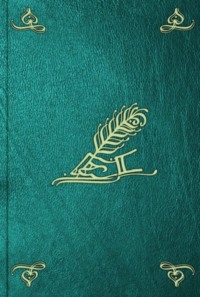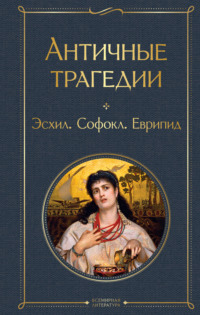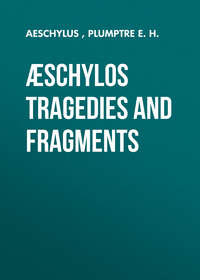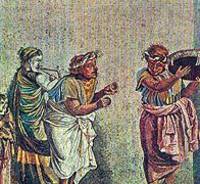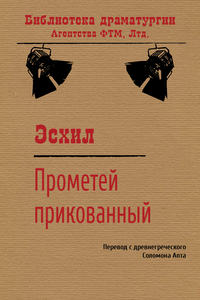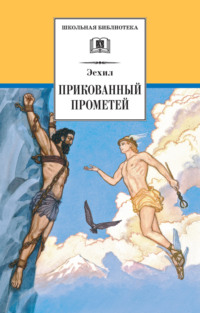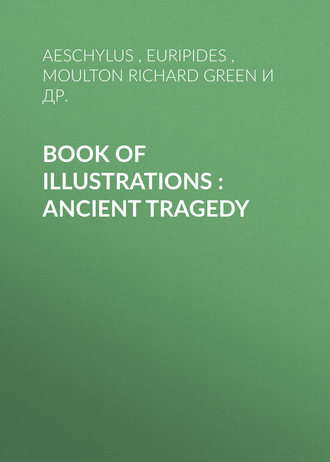 полная версия
полная версияBook of illustrations : Ancient Tragedy
A passionate dialogue (in mixed verse: Electra, speaking lyrics, Orestes Blank Verse) of exultation and weeping succeeds: until finally Orestes is calling back their thoughts to the plans of vengeance when enter from Palace Attendant of Orestes, who chides them for their loud joy, which he has barely been able to prevent from reaching the ears of Clytaemnestra. Electra is informed who this attendant is, and joyfully recognizes him and calls him father for his faithfulness. He cuts conversation short and hurries Orestes and Pylades within. Electra with a prayer retires. {1383}
CHORAL INTERLUDE IIIShort expression of the sense of a critical moment: Strophe, Ares and the Avengers are on their way —Antistrophe, they have passed beneath the roof-tree. {1397}
EXODUS, OR FINALEElectra rushes out to stand on guard against Aegisthus while vengeance is being done on Clytaemnestra. – Cries from within; Electra and Chorus perceive that the deed is done. – Enter Orestes and Pylades from the Palace red-handed; they are about to triumph when Electra thrusts them back, for Aegisthus is at hand. —Enter Aegisthus enquiring for the strangers of Electra. {1442}
Aegis. Where are the strangers, then? Tell this to me. Elec. Within; for they have found a loving hostess. Aegis. And did they say distinctly he was dead? Elec. Ah no! they showed it, not in words alone. Aegis. And is it here, that we may see it plain? Elec. 'Tis here, a sight most pitiful to see. Aegis. Against thy wont thou giv'st me cause for joy. Elec. Thou may'st rejoice, if this be ground of joy. Aegis. I hid you hush, and open wide the gates That all of Argos and Mycenae see, So if there be that once were lifted up With hopes they had, vain hopes they fixed on him, Now seeing him dead, they may receive my curb, And finding me their master, sense may gain Without coercion. Elec. And that end is reached By me; for I by time have wisdom gained, To yield to those more mighty.The doors are thrown open, and disclose Orestes and Pylades standing by the dead body of Clytaemnestra, which is covered with a sheet and a veil over the face.
Aegis. Lo, I see, O Zeus, a sight that comes right well for me. (Without offence I say it; should it move The wrath divine, I wish it all unsaid.) Withdraw the veil which hides the face, that I To kindred blood may pay the meed of tears. Ores. Do thou uplift it. 'Tis thy task not mine, To look on this, and kindly words to speak. Aegis. Thou giv'st good counsel, and I list to thee, And thou, if yet she tarries in the house, Call Clytaemnestra. Ores. (as Aegisthus lifts the veil) Here she lies before thee, Seek her not elsewhere, {1474} Aegis. Oh what sight is this! Ores. Whom fearest thou? Who is't thou dost not know? Aegis. Into whose snares, whose closely-tangled mesh Have I, poor victim, fallen? Ores. Saw'st thou not Long since that thou didst speak to them that live As they were dead? Aegis. Ah me! I catch thy words. It needs must be that he who speaks to me Is named Orestes. Ores. Wert thou then deceived, Thou excellent diviner? Aegis. Woe is me! I perish, yet permit me first to speak One little word. Elec. Give him no leave to speak, By all the gods, my brother, nor to spin His long discourse. When men are plunged in ills What gain can one who stands condemned to die Reap from delay? No, slay him out of hand; And, having slain him, cast him forth, to find Fit burial at their hands from whom 'tis meet That he should have it, far away from view. Thus only shall I gain a remedy For all the evils of the years gone by. Ores. [To Aegisthus.] Go thou within, and quickly. Now our strife Is not of words, but for thy life itself. Aegis. Why dost thou force me in? If this be right, What need of darkness? Why not slay at once? Ores. Give thou no orders, but where thou did'st slay My father go, that thou too there may'st die. Aegis. Truly the doom is fixed, this house should see The ills that on the house of Pelops fall, Or present, or to come. Ores. Yes, those that fall On thee: of these I am a prophet true. Aegis. Thou boastest of a skill which he had not — Thy father. Ores. Still thou bandiest many words, And length'nest out the way. Move on. Aegis. Lead thou. Ores. Not so, thou must go first. Aegis. Dost think I'll flee? Ores. Thou must not die the death thou would'st desire. I needs must make it utter. Doom like this Should fall on all who dare transgress the laws, The doom of death. Then wickedness no more Would multiply its strength. Chor. O seed of Atreus, after many woes, Thou hast come forth, thy freedom hardly won, By this emprise made perfect![1
THE ELECTRA OF EURIPIDES6
PROLOGUEThe Scene is in front of a Peasant's Cottage: the Centre is the door of the Cottage, the scene on the two sides of it represents the ways to fields and to the river. Time: early Morning, the stars still shining.
Enter from the Cottage the Peasant on his way to his day's work. In the form of a Morning Prayer to the stream Inachus, he makes known the situation of affairs, the murder of Agamemnon, etc. – and in particular how Aegisthus, fearing lest some nobleman might marry Electra and be her avenger, had forced her into wedlock with himself, a peasant, honest but in the lowest poverty. But he is too good a friend to his master's house and to the absent Orestes to wrong Electra; he has been a husband only in name, to give her the shelter of his humble roof. Enter Electra from the Cottage with a watering pot: not seeing the Peasant she in a similar soliloquy announces that she is on her way to the river to prosecute her unnatural toil.
Peas. Why will thou thus, unhappy lady, toil For my sake bearing labours, nor desist At my desire? Not thus hast thou been train'd. Elec. Thee equal to the gods I deem my friend, For in my ills thou hast not treated me With insult. In misfortunes thus to find What I have found in thee, a gentle pow'r, Lenient of grief, must be a mighty source Of consolations. It behoves me then, Far as my pow'r avails, to ease thy toils, That lighter thou may'st feel them, and to share Thy labour, though unbidden; in the fields Thou hast enough of work; be it my task Within to order well. The lab'rer tired Abroad, with pleasure to his house returns. Accustom'd all things grateful there to find. Peas. Go then, since such thy will; nor distant far The fountain from the house. At the first dawn My bullocks yoked I to the field will drive, And sow my furrows; for no idle wretch With the gods always in the mouth can gain Without due labour the support of life. {95}Stage vacant a moment. Then enter by Distance-door Orestes and Pylades.
Orestes in conversation with his friend makes known he is come by divine command to avenge his father's death: he has fulfilled the god's first charge to present offerings on his father's tomb; the second is that he must not enter the walls of the city; thus he wishes to find his sister – now, as he hears, wedded to a peasant! – and consult – they step aside as they see one whom 'female slave her tresses show' approaching. {127}
Re-enter Electra with her water-pot filled: and in a Monody (strophe, antistrophe and epode) laments her situation: laments for her lost father, her brother afar off, in servitude it may be: and adjures her father's spirit to send vengeance. {187}
PARODE JOINING ON TO EPISODE IEnter the Orchestra Chorus of Maidens of Mycenae, and in dialogue (two Strophes and Antistrophes) beg Electra to join them in an approaching festival, as she had been wont in happier days. – Electra declares she is fit for tears and rags, not for festivities. – As for rags they will find her the festal robes; and vows, instead of tears may gain the goddess's help. – No god, says Electra, has an ear for the wretched, and in wretched toil and obscure retreat her life is wasting away. —A sob from the concealed Orestes startles them, and they are about to flee, when Orestes and Pylades discover themselves and reassure them. With difficulty he restrains his emotions throughout a long conversation, personating a messenger from himself to Electra.
Ores. Bearing thy brother's words to thee I come. {251} Elec. Most welcome: breathes he yet this vital air? Ores. He lives: I first would speak what brings thee joy. Elec. Oh be thou blest for these most grateful words! Ores. To both in common this I give to share. Elec. Where is th' unhappy outcast wand'ring now? Ores. He wastes his life not subject to one state. Elec. Finds he with toil what life each day requires? Ores. Not so; but mean the wand'ring exile's state. Elec. But with what message art thou from him charg'd? Ores. T' inquire, if living, where thou bear'st thy griefs. Elec. First then observe my thin and wasted state. Ores. Wasted with grief, so that I pity thee. Elec. Behold my head, its crisped honours shorn. Ores. Mourning thy brother, or thy father dead? Elec. What can be dearer to my soul than these? Ores. Alas! What deem'st thou are thy brother's thoughts? Elec. He, though far distant, is most dear to me. Ores. Why here thy dwelling from the city far? Elec. O, stranger, in base nuptials I am join'd – Ores. I feel thy brother's grief! – To one of rank? Elec. Not as my father once to place me hop'd – Ores. That hearing I may tell thy brother, speak. Elec. This is his house: in this I dwell remote. Ores. This house some digger or some herdsman suits. Elec. Generous, though poor, in reverence me he holds. Ores. To thee what reverence doth thy husband pay? Elec. He never hath presumed t' approach my bed.
The conversation is prolonged, bringing out for the benefit of the Strangers and the Chorus the whole of Electra's troubles, and how her father's blood is crying for vengeance.
Elec. The monarch's tomb Unhonoured, nor libations hath receiv'd, Nor myrtle bough, no hallow'd ornament Hath dignified the pyre. Inflamed with wine, My mother's husband, the illustrious lord, For so they call him, trampled on the earth Insultingly where Agamemnon lies, And hurling 'gainst his monument a stone, Thus taunts us with proud scorn, "Where is thy son, "Orestes where? right noble is thy tomb "Protected by his presence." Thus he mocks The absent; but, O stranger, tell him this Suppliant I beg thee. {371}Enter unexpectedly the Peasant. On hearing that these strangers are messengers from Orestes, he instantly calls for refreshments to be brought, and begs the stranger to delay no longer to enter the cottage: poverty must be no excuse for not offering what hospitality he has. – A burst of admiration is drawn from Orestes. {400}
Ores. Nature hath giv'n no outward mark to note The generous mind; the qualities of men To sense are indistinct. I oft have seen One of no worth a noble father shame, And from vile parents worthy children spring, Meanness oft grov'lling in the rich man's mind, And oft exalted spirits in the poor. How then discerning shall we judge aright? By riches? ill would they abide the test. By poverty? on poverty awaits This ill, through want it prompts to sordid deeds. Shall we pronounce by arms? but who can judge By looking on the spear the dauntless heart? Such judgment is fallacious; for this man, Nor great among the Argives, nor elate With the proud honours of his house, his rank Plebeian, hath approv'd his liberal heart. Will you not then learn wisdom, you whose minds Error with false presentments leads astray? Will you not learn by manners and by deeds To judge the noble? Such discharge their trust With honour to the state and to their house. Mere flesh without a spirit is no more Than statues in the forum; nor in war Doth the strong arm the dang'rous shock abide More than the weak; on nature this depends And an intrepid mind. But we accept Thy hospitable kindness; for the son Of Agamemnon, for whose sake we come, Present or not is worthy to this house. Go, my attendants, I must enter it; This man, though poor, more cheerful than the rich Receives me; to his kindness thanks are due. More would it joy me if thy brother, blest Himself, could lead me to his prosperous house: Yet haply he may come; th' oracular voice Of Phoebus firmly will be ratified: Lightly of human prophecies I deem. {438}[Orestes and his attendants enter the house.]
Electra is in a quandary at the idea of people of such rank being invited into her humble cottage.
Peas. Why not? If they are noble, as their port Denotes them, will they not alike enjoy Contentment, be their viands mean or rich?
The only device Electra can think of is to send to an old servant of her father's house – the same who, as Tutor, preserved the child Orestes on the fatal night – now an aged herdsman forced to hide himself in obscurity, and ask him to help them in this emergency. Exit Peasant to the fields to find the old Tutor; Electra into the cottage. {474}
CHORAL INTERLUDE Iapostrophises the array of ships that went to the Trojan war, the great chiefs who commanded, especially Achilles, whose shield they have seen, with its Gorgons, and Sphinxes, and Hermes in flight, and other wondrous figures – suddenly at the end connects itself with the subject of the play by the thought: it was the Prince who commanded heroes like these that a wicked wife dared to slay! {530}
EPISODE IIEnter from the fields the Aged Tutor, tottering under the weight of a kid and other viands, clad in rags, and in tears. Electra wonders why he weeps: to mourn for Agamemnon or Orestes is surely now to mourn in vain.
Tut. In vain; but this my soul could not support; {553} For to his tomb as on the way I came, I turned aside, and falling on the ground, Alone and unobserved, indulg'd my tears; Then of the wine, brought for thy stranger guests, Made a libation, and around the tomb Plac'd myrtle branches; on the pyre I saw A sable ewe, yet fresh the victim's blood, And clust'ring auburn locks shorn from some head; I marvell'd, O my child, what man had dar'd Approach the tomb, for this no Argive dares. Perchance with secret step thy brother came And paid these honors to his father's tomb. But view these locks, compare them with thine own, Whether like thine their color; nature loves In those who from one father draw their blood In many points a likeness to preserve. Elec. Unworthy of a wise man are thy words, If thou canst think that to Mycenae's realms My brother e'er with secret step will come, Fearing Aegisthus. Then between our locks What can th' agreement be? To manly toils He in the rough Palaestra hath been train'd, Mine by the comb are soften'd; so that hence Nothing may be inferr'd. Besides, old man, Tresses like-color'd often may'st thou find Where not one drop of kindred blood is shar'd. Tut. Trace but his footsteps, mark th' impression, see If of the same dimensions with thy feet. Elec. How can th' impression of his foot be left On hard and rocky ground? But were it so, Brother and sister never can have foot Of like dimensions: larger is the man's. Tut. But hath thy brother, should he come, no vest Which thou wouldst know, the texture of thy hands, In which when snatch'd from death he was array'd? Elec. Know'st thou not, when my brother from this land Was saved, I was but young? But were his vests Wrought by my hands, then infant as he was, How could he now in his maturer age Be in the same array'd, unless his vests Grew with his person's growth? No, at the tomb Some stranger, touch'd with pity, sheared his locks, Or native, by the tyrant's spies unmark'd. Tut. Where are these strangers? I would see them: much Touching thy brother wish I to inquire. Elec. See, from the house with hast'ning step they come. {599}Re-enter Orestes and Pylades: Conversation in which the aged Tutor eyes him curiously all over, and declares he is Orestes – general recognition and burst of joy. – Then they turn to vengeance, and in stichomuthic dialogue lay their plans. Aegisthus, the Tutor says, is to come to a neighboring field to celebrate a sacrifice; they lay a plan for Orestes and Pylades to gain admission as travellers and kill him in the moment of sacrifice. As to Clytaemnestra: a report is prevalent in the palace that Electra has given birth to a child; they conspire to give currency to the report and invite Clytaemnestra to perform the ten days' rite: once in the house, Orestes will do the dreadful deed; they tremble at their horrid tasks, but their father must be avenged. —Exeunt Orestes and, his Attendants to the fields; and Electra to the Cottage begging the Chorus, who are privy to all this as confidential friends, to keep watch and summon her if news comes. {763}
CHORAL INTERLUDE IIStrophe 1. The Argive mountains round,
'Mongst tales of ancient days From age to age recorded this remains: Tuned to mellifluous lays, Pan taught his pipe to sound, And as he breath'd the sprightly-swelling strains, The beauteous ram, with fleece of gold, God of shepherds, on he drove. The herald from the rock above Proclaims, "Your monarch's wonders to behold, "Wonders to sight, from which no terrors flow, "Go, Mycenaeans, to th' assembly go." With reverence they obey the call, And fill th' Atridae's spacious hall.Antis. Its gates with gold o'erlaid,
Wide oped each Argive shrine, And from the altar hallow'd flames arise; Amidst the rites divine, Joying the Muse to aid, Breath'd the brisk pipe its sweet notes to the skies; Accordant to the tuneful strain Swell'd the loud acclaiming voice, Now with Thyestes to rejoice: He, all on fire the glorious prize to gain, With secret love the wife of Atreus won, And thus the shining wonder made his own; Then to the assembly vaunting cried, "Mine is the rich Ram's golden pride."Strophe 2. Then, oh then, indignant Jove
Bade the bright sun backward move, And the golden orb of day, And the morning's orient ray; Glaring o'er the Western sky Hurl'd his ruddy lightnings fly; Clouds, no more to fall in rain, Northward roll their deep'ning train; Libyan Ammon's thirsty seat, Wither'd with the scorching heat, Feels nor show'rs nor heavenly dews Grateful moisture round diffuse.Antis. 2. Fame hath said (but light I hold
What the voice of fame hath told) That the sun, retiring far, Backward roll'd his golden car; And his vital heat withdraw, Sick'ning man's bold crimes to view. Mortals, when such tales they hear, Tremble with an holy fear, And th' offended gods adore; She, this noble pair who bore, Dar'd to murder, deed abhorr'd! This forgot, her royal lord. {815}EPISODE IIIAs the Ode is concluding, shouts are heard from the direction of the field where the sacrifice is: Chorus summon Electra.
After a brief conversation, a Messenger arrives breathless, and after rapidly giving the news that Aegisthus has fallen, is encouraged to tell the scene at length, which he does in the regular 'Messenger's Speech.'
Mess. Departing from this house, the level road {845} We enter'd soon, mark'd by the chariot wheel On either side. Mycenae's noble king Was there, amidst his gardens with fresh streams Irriguous walking, and the tender boughs Of myrtles, for a wreath to bind his head, He cropt; he saw us, he address'd us thus Aloud: "Hail, strangers; who are ye, and whence Come, from what country?" Then Orestes said, "Thessalians; victims to Olympian Jove We at the stream of Alpheus go to slay." The King replied, "Be now my guests, and share The feast with me; a bullock to the Nymphs I sacrifice; at morn's first dawn arise, Then shall you go; but enter now my house." Thus as he spoke, he took us by the hand And led us, nothing loth: beneath his roof Soon as we came, he bade his slaves prepare Baths for the strangers, that, the altars nigh, Beside the lustral ewers they might stand. Orestes then, "With lavers from the pure And living stream we lately have been cleansed: But with thy citizens these rites to share, If strangers are permitted, we, O King, Are ready to thy hospitable feast, Nothing averse." The converse here had end. Their spears, with which they guard the king, aside Th' attendants laid, and to their office all Applied their hands; some led the victim, some The baskets bore, some rais'd the flames and plac'd The cauldrons on the hearth; the house resounds. Thy mother's husband on the altars cast The salted cakes, and thus address'd his vows; "Ye Nymphs that haunt the rocks, these hallow'd rites Oft let me pay, and of my royal spouse Now absent, both by fortune blest as now; And let our foes as now, in ruin lie;" Thee and Orestes naming. But my lord, Far other vows address'd, but gave his words No utt'rance, to regain his father's house. Aegisthus then the sacrificing sword Took from the basket, from the bullock's front To cut the hair, which on the hallow'd fire With his right hand he threw; and, as his slaves The victim held, beneath its shoulder plung'd The blade; then turning to thy brother spoke: "Among her noble arts Thessalia boasts To rein the fiery courser, and with skill The victim's limbs to sever; stranger, take The sharp-edg'd steel and show that fame reports Of the Thessalians truth." The Doric blade Of temper'd metal in his hand he grasp'd, And from his shoulders threw his graceful robe; Then to assist him in the toilsome task Chose Pylades, and bade the slaves retire: The victim's foot he held, and its white flesh, His hand extending, bared, and stript the hide E'er round the course the chariot twice could roll, And laid the entrails open. In his hands The fate-presaging parts Aegisthus took, Inspecting: in the entrails was no lobe; The valves and cells the gall containing show Dreadful events to him, that view'd them, near. Gloomy his visage darken'd; but my lord Ask'd whence his sadden'd aspect: He replied — "Stranger, some treachery from abroad I fear; Of mortal men Orestes most I hate, The son of Agamemnon; to my house He is a foe." "Wilt thou," replied my lord, "King of this state, an exile's treachery dread? But that, these omens leaving, we may feast, Give me a Phthian for this Doric blade, The breast asunder I will cleave." He took The steel and cut. Aegisthus, yet intent, Parted the entrails; and, as low he bow'd His head, thy brother, rising to the stroke, Drove through his back the ponderous axe, and riv'd The spinal joints: his heaving body writh'd And quiver'd, struggling in the pangs of death. The slaves beheld, and instant snatched their spears, Many 'gainst two contesting; but my lord And Pylades with dauntless courage stood Oppos'd, and shook their spears. Orestes then Thus spoke: "I come not to this state a foe, Nor to my servants; but my father's death I on his murderer have aveng'd; you see Th' unfortunate Orestes: kill me not, My father's old attendants." At these words They all restrain'd their spears, and he was known By one grown hoary in the royal house. Crowns on thy brother's head they instant plac'd With shouts of joy. He comes, and with him brings Proof of his daring, not a Gorgon's head, But whom thou hat'st, Aegisthus: blood for blood, Bitter requital, on the dead has fall'n. {939}General exultation (in Lyric measures) succeeds, which increases as Orestes and Pylades re-enter bearing the corpse of Aegisthus. After brief celebration of the deed the face of the corpse is uncovered, and Electra, gazing at it, gives vent to her scorn and hatred: how he had slain a hero, made her an orphan, lived in shame with her mother, enjoying and trusting in her father's wealth: but


